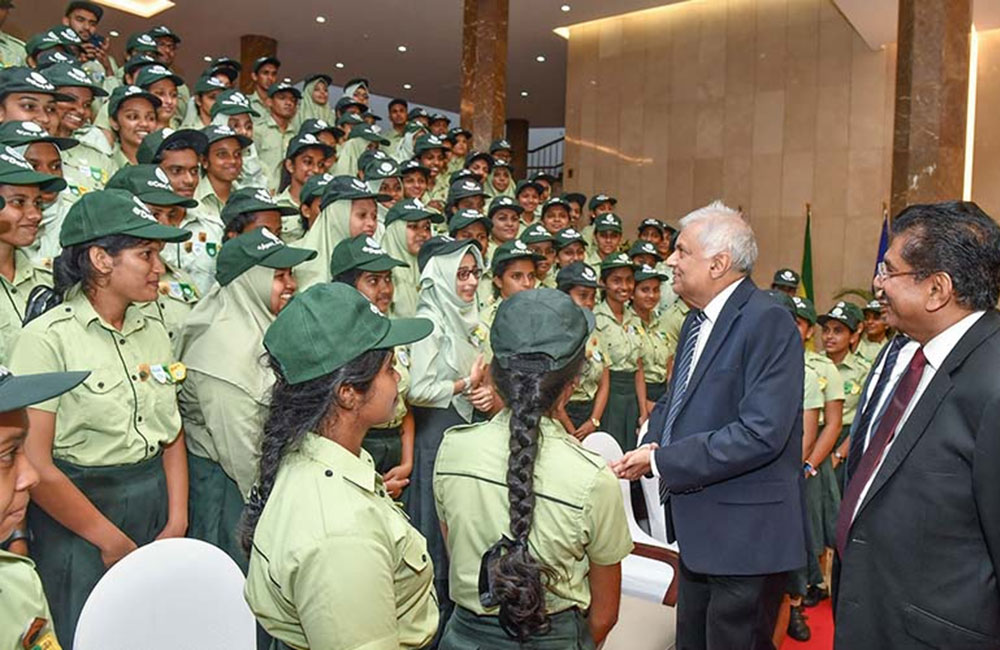Efforts made thus far have been insufficient in preventing climate change and amount to nothing more than procrastination – Says President during the Environment Pioneer awards ceremony
During the 10th Environment Pioneer President’s Medal Awarding Ceremony 2020-2021 held at the Bandaranaike Memorial International Conference Hall, President Ranil Wickremesinghe announced that Sri Lanka is establishing the world’s first international environmental university to support the global effort in addressing climate change.
The President acknowledged that although climate change is a significant challenge for the world, there is no central research hub to study it, and invited multiple countries to join Sri Lanka in the effort.
President Wickremesinghe also stressed that the actions taken so far have only delayed climate change, and not stopped it. The ceremony recognized the excellent service of teachers, schools, regional environmental officials, and offices, with 129 environmental pioneers being awarded Presidential Medals. The Environment Pioneer President’s Medal is the highest accolade under the National Environment Pioneer President’s Medal, and the winners receive an additional 04 points in university entrance.
Aralagangwila Wilayaya National School was awarded as the best school, producing 14 Environment Pioneer President’s Medal winners, while the Central Provincial Office of the Central Environment Authority received the award for the best office, guiding the most significant number of Environment Pioneer President’s Medal winners (25). The Environment Pioneer President’s Medal recipients took a group photo with President Wickremesinghe, who urged them to spread the message of environmental protection in schools as environmental pilots.
The President emphasized that being an environmental pilot is a significant sacrifice and is dedicated to the betterment of future generations.
The President further expressed his views and said,
“As the President of Sri Lanka, I would like to begin by congratulating all the environmental pioneers who have received medals today. This is a commitment that they have made voluntarily, since the establishment of the Central Environment Authority in 1984.
All of us who are part of this movement are making a great sacrifice for the benefit of future generations. The environmental problems in the world today are well known to everyone. Our challenge today is not just to stop climate change, but to slow it down, and we must be successful in this effort.
Over the last two centuries, the world has undergone great changes. When the British arrived in Sri Lanka and signed the Upcountry Treaty in 1815, the population of our country was only two million or less. When we got universal suffrage in 1931, that number had grown to five million. By the time we gained independence, it was seven million. Today, our population has tripled, but our land has not increased, and the amount of forests has decreased.
As a former government minister in 1970, I remember allocating 150,000 -200,000 acres on the side of Polonnaruwa to start the Mahaweli movement. Today, people are living in those areas, and we have become self-sufficient in rice as a result. If that land had not been allocated then, we would not be self-sufficient in rice today.
The world has changed drastically since the time of our ancestors. The consumption patterns of households have increased with the availability of modern amenities like air conditioners, different types of food, and other consumables. The industrial revolution has also led to increased industrialization worldwide, with its attendant environmental impacts. Two major wars broke out during this period, including the dropping of atomic bombs, leading to environmental destruction and changes in our climate.
By 2050, the world’s population is expected to increase even more, and we must be prepared to face the challenges of climate change. As a country, we have taken many steps to address these issues, including the creation of a climate change hub, and the introduction of new rules to protect the Sinharaja forest, Horton plains, Siripada site, and the Knuckles range.
While the environmental laws that we introduced in the past were modern back then, they have become out-dated now, and we need new and more effective environmental and climate change laws to ensure the sustainable development of our country.
As the Minister of Environment, I am proud to announce that we are bringing new laws to protect nature reserves like Muthurajawela and creating new forests. We have taken steps to create the necessary laws for this.
But we didn’t stop there. Recognizing the importance of addressing climate change, we believe it should be included in school and university curricula. That’s why we are planning to establish the International University of Climate Change, which will be the world’s first international environmental university. We expect it to provide opportunities for post-graduation and research work.
Currently, there is no centre in the world dedicated to conducting research on climate change. Therefore, we are taking steps to start the International University on Climate Change by establishing that centre in Sri Lanka. We hope to carry out this work with the participation of many countries and give membership of the governing board to those countries and organizations.
We believe that 2,000-3,000 people will enrol in this university every year, get the necessary training, and build a great relationship with the world. We hope this will be a support that Sri Lanka can provide to face climate change. Therefore, we have discussed this with a number of governments and will be presenting information on this at the conference on climate change in Dubai this year.
As the Minister of Environment, I request all environmental pioneers to convey this message of protecting the environment to their schools. It is your responsibility to provide the necessary guidance for that.”
Minister of Environment Nasir Ahmed, Secretary of the Ministry of Environment Consultant Dr. Anil Jasinghe, Secretary of the Ministry of Education M. N. Ranasinghe, Central Environment Authority Chairman Supun S. Pathirage, Acting Director General Dr. R. M. S. K. Rathnayake, environmental Pioneer presidential award winners, their parents, principals, teachers and others participated in this event.

Leave your comments
Login to post a comment
Post comment as a guest